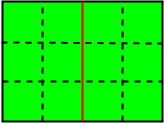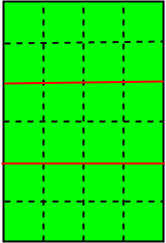给定n×m的大矩形区域(具有单位正方形)并允许k倍的切割,切割应该是笔直的(水平或垂直),并且应沿着单位正方形的边缘进行。准确地进行k次切割可以得到的最小工件的最大可能面积是多少。
例子 :
Input : 3 4 1
Output : 6
Input : 6 4 2
Output : 8
第二个输入的图像

第一个输入的图像
由于这是n×m的矩形区域,因此有(n-1)行和(m-1)列。因此,如果k>(n + m – 2),则不可能进行切割。那么,如果k小于那个。有两种情况
- 当k小于max(n,m)– 1时:在第一种情况下,如果k小于max(n,m)– 1,则m *(n /(k + 1))或n *( m /(k + 1))最大值,这里我们将其除以(k +1),因为水平或垂直方向即(m * n =总块数)被分为(k +1)个部分。
- 当k大于或等于max(n,m)– 1时:在第二种情况下,如果k> = max(n,m)– 1,则行和列都将被剪切,因此,最大可能的最小面积为m /(k – n + 2)或n /(k – m + 2) 。在这种情况下,假设如果n> m,则首先可以进行n-1(行或列)切割。之后(k – n)切割将在m – 1上进行。因此,在这里我们调整了这个(k – n)切口,使得最小的可能除法应该最大。
代码–以下是以下方法的实现
C++
// C++ code for Maximum of smallest
// possible area that can get with
// exactly k cut of given rectangular
#include
using namespace std;
void max_area(int n, int m, int k)
{
if (k > (n + m - 2))
cout << "Not possible" << endl;
else {
int result;
// for the 1st case
if (k < max(m, n) - 1) {
result = max(m * (n / (k + 1)), n * (m / (k + 1)));
}
// for the second case
else {
result = max(m / (k - n + 2), n / (k - m + 2));
}
// print final result
cout << result << endl;
}
}
// driver code
int main()
{
int n = 3, m = 4, k = 1;
max_area(n, m, k);
} Java
// Java code for Maximum of smallest
// possible area that can get with
// exactly k cut of given rectangular
class GFG {
//Utility Function
static void max_area(int n, int m, int k)
{
if (k > (n + m - 2))
System.out.println("Not possible");
else {
int result;
// for the 1st case
if (k < Math.max(m, n) - 1)
{
result = Math.max(m * (n / (k + 1)),
n * (m / (k + 1)));
}
// for the second case
else {
result = Math.max(m / (k - n + 2),
n / (k - m + 2));
}
// print final result
System.out.println(result);
}
}
// Driver code
public static void main (String[] args)
{
int n = 3, m = 4, k = 1;
max_area(n, m, k);
}
}
// This code is contributed by Anant Agarwal.Python3
# Python3 code for Maximum of smallest
# possible area that can get with
# exactly k cut of given rectangular
def max_area(n,m,k):
if (k > (n + m - 2)):
print("Not possible")
else:
# for the 1st case
if (k < max(m,n) - 1):
result = max(m * (n / (k + 1)), n * (m / (k + 1)));
# for the second case
else:
result = max(m / (k - n + 2), n / (k - m + 2));
# print final result
print(result)
# driver code
n = 3
m = 4
k = 1
max_area(n, m, k)
# This code is contributed
# by Azkia Anam.C#
// C# code for Maximum of smallest
// possible area that can get with
// exactly k cut of given rectangular
using System;
class GFG {
//Utility Function
static void max_area(int n, int m, int k)
{
if (k > (n + m - 2))
Console.WriteLine("Not possible");
else {
int result;
// for the 1st case
if (k < Math.Max(m, n) - 1)
{
result = Math.Max(m * (n / (k + 1)),
n * (m / (k + 1)));
}
// for the second case
else {
result = Math.Max(m / (k - n + 2),
n / (k - m + 2));
}
// print final result
Console.WriteLine(result);
}
}
// Driver code
public static void Main ()
{
int n = 3, m = 4, k = 1;
max_area(n, m, k);
}
}
// This code is contributed by vt_m.PHP
($n + $m - 2))
echo "Not possible" ,"\n";
else
{
$result;
// for the 1st case
if ($k < max($m, $n) - 1)
{
$result = max($m * ($n / ($k + 1)),
$n * ($m / ($k + 1)));
}
// for the second case
else
{
$result = max($m / ($k - $n + 2),
$n / ($k - $m + 2));
}
// print final result
echo $result ,"\n";
}
}
// Driver Code
$n = 3; $m = 4; $k = 1;
max_area($n, $m, $k);
// This code is contributed by ajit
?>Javascript
输出 :
6